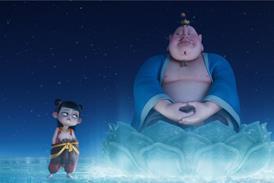Harry Brown script-writer Gary Young and producer Gael McLaughlin talk about their joint project, Madam Samurai, a graphic novel/feature film about a female samurai warrior in Victorian London.
UK script writer Gary Young and budding independent producer Gael McLaughlin first met on the set of Scott Mann’s 2009 film The Tournament, which Young wrote and McLaughlin worked as production consultant, before going on to work together on Harry Brown.
McLaughlin, who has a background in documentary shorts, is one of six producers taking part in the UK’s Magic Light Producer Placement Programme. She has recently set up her own production company, Mobius Pictures.
The pair are currently collaborating on Madam Samurai, and another feature project, The School, a British horror film about a school where the children go missing, which is being backed by EM Media and Northern Film.
Young is also developing a New Orleans based thriller, to be directed by William Friedkin, as well as a modern day British noir thriller, called The Unemployed Detective, a companion piece to Harry Brown, about redemption, vice and pornography.
Where did the idea for Madam Samurai come from?
GM: It was an idea I was researching for a factual project. It was illegal to leave Japan at that time [19th century] and there started to be an interest from the Japanese who wanted to escape here and vice versa, Victorian Britain became quite obsessed with the Japanese and Oriental cultures. Some of the Japanese who came over here ended up at University College in London and then these five samurais went back and formed the government of modern Japan.
I was looking into that as an idea and started to wonder, where did the women feature in the Samurai culture? And what would happen if a woman trained as a Samurai. And so I pitched the idea to Gary, and it really gelled with him.
Why did the concept appeal to you Gary?
GY: The minute Gael said female samurai in Victorian London, I said stop there, you’ve got me. It had me instantly. I thought it was a really interesting story.
I like my Samurai movies, and for a long time I have been wanting to write a film for a tough female lead, a female action hero, and I’ve always been fascinated by the Jack The Ripper story, so I’ve brought them together.[in the story, the female samurai is pursuing Jack The Ripper].
You wrote the script for a feature film, but then decided to turn it into a graphic novel..
GY: I wrote the script and we had people reading it, but the problem we had in the UK was people saying it was great, wonderful, fantastic, but that they didn’t have the finances to make it into a film.
At the same time, my agent showed it to her friend, a journalist who was a huge comic book fan, who said that the script had that comic book mythology to it. So I suggested to Gael that we turn it into a graphic novel first.
I grew up reading comic books, and I always thought in the back of my mind that I’d love to do a graphic novel, especially as I don’t think anyone has done a Samurai comic book in a major way.
How do you think the graphic novel will help you to get the feature film made?
GY: What the comic book does is enhances the script. The idea, of Samurais in London and Jack The Ripper requires a leap of faith, so the graphic novel enhances it a million times more than if it was just a cold script. It’s the cinematic Field Of Dreams. Build it and they will come.
GM: It’s brought the project to life. It’s like having a storyboard. It also means it is a brand. We launched book one in June (the second volume will be released in early 2011) and already have a facebook following, fans who tell us that they want the first and second book in one film. We are developing a fan base. It also gives us a way to test the story – and see if people like it, see if it works.
It hopefully removes some level of risk for an investor if they know it’s already out there.
What kind of budget would you be looking at for the feature version?
GM: It’s hard to say because a budget can expand depending on the cast, but we are looking at live action, CGI and period settings, so realistically we are probably looking at £20/30m. It’s an expensive thing to set up and complete. Realistcally, we are going to need studio involvement, but we are looking at European companies like Europacorp, who have studio involvement. That would be an interesting route.
GY: we have broken all the rules with Samurai, because realistically, you should never really write a script in the UK that you couldn’t shoot for a million pounds. Gael and I worked out pretty quickly that it would be well beyond what we had access to, but I couldn’t have just put it to one side. That would be madness for a writer. You have to follow your heart.
Have you got an actress in mind for the female lead?
GY: I think the female lead should be an unknown. Normally I cast it in my own head, but for this, I think it should be someone who is unknown, who would make the part their own.
It’s very much a director’s movie, because it’s such a visual action piece, with Japan and London, plus it’s got a lot of emotion and character. To me, the director would be the star of the film.
How would you pitch the film, in one line?
GY: It’s as if Charles Dickens had rewritten Kill Bill and Kurosawa was going to direct!
A female Samurai in Victorian London..it sounds like a world away from Harry Brown?
On the surface they are different, but actually there are a lot of parallels. Madam Samurai and Harry Brown are both disenfranchised characters, not traditional action heroes, but they are both warriors on a path of vengeance.
Also there are big parallels between Victorian Britain and today. The Whitechapel area was known as murder mile, it was a society of haves and have nots, opium addiction was rife, and they had gang crime. So all the things we struggle with now in modern society.
Were you surprised by the success of Harry Brown? Has it opened doors to you?
GY: When I read the script, I suppose I kind of knew it was one of the best things I’d written up to that point, and that I had tapped into something – Broken Britain. We caught a bit of the zeitgeist. But it was a very dark movie, a difficult piece. It isn’t the sort of thing that you would imagine being the hit that it was.
It’s opened doors for both myself and Gael. I’m working with people and doing things now, only because of Harry Brown. I’ve never been so busy.






















No comments yet